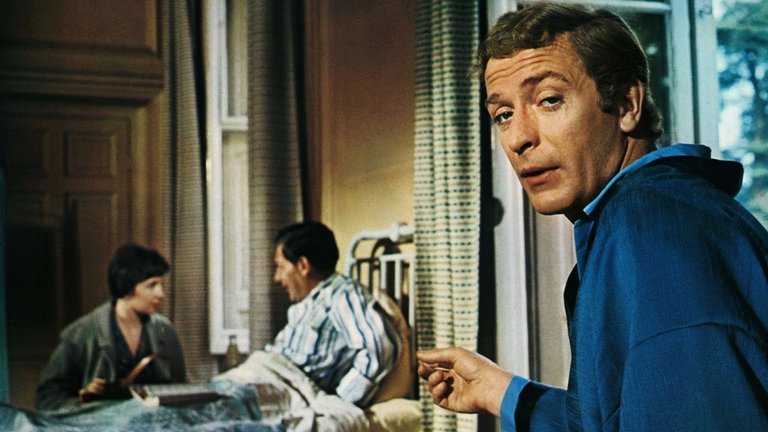Film Review: Alfie (1966)

Social and cultural turmoil of 1960s allowed production of films that couldn’t have been made before. But that very historical also made many of those films, even some important and celebrated, to look strangely dated today. One such films is Alfie, 1966 British drama directed by Lewis Gilbert.
The film is based on the eponymous stage play by Bill Naughton, who also wrote screenplay. The protagonist, played by Michael Caine, is Alfie Elkins, London chauffeur who uses his job as an opportunity to seduce women. Thanks to his irresistible charm and youthful confidence, Alfie became very successful in his romantic life, but relationships he has lack any commitment and he treats his girlfriends, many of whom are married, with disrespect. This leaves trail of devastation in his wake, including some of them, like Gilda (played by Julia Foster) pregnant. Alfie’s lifestyle doesn’t change much even after unnamed health scare forces him to spend some time in sanatorium, where he seduces nurses and befriends Harry Clamacraft (played by Alfie Bass), fellow patient whose wife Lily (played by Vivien Merchant) would become his next conquest, with unforeseen and emotionally devastating consequences. Alfie would at the end be given taste of his own medicine by rich and promiscuous American tourist Ruby (played by Shelley Winters) and, left alone, wonder “what is all about”.
Alfie is best known for two things. The first is “Alfie”, the song composed by legendary Burt Bacharach and written by Hal David, which had been performed by many prominent artists and became one of the standards of 1960s pop music. The other is breakout performance of Michael Caine, British actor who is considered one of the cinema legends in last half of century. When he made Alfie, Caine was relatively young actor who had mostly played supporting roles. Role of Alfie Elkins brought him enormous success and the first Oscar nomination, thus guaranteeing the continuation of career. Caine originally wasn’t the first choice for the role. Terence Stamp, who has played it on stage, hadn’t been happy with his performance and instead suggested his good friend Caine who looked like he was born to play it. In an essence, Caine adds a lot of his own working class background, together with Cockney accent, into the role, but he also encapsulates the spirit of the Swinging London, the period when young Britons, like their counterparts in other countries, enthusiastically broke with the traditional values and embraced new freedom, especially those associated with Sexual Revolution. Alfie represents the typical example of the new sexual mores based on hedonism and instant self-gratification at the expense of duty. He enjoys it and is unapologetic about it, despite leaving trail of destruction among female partners and making Alfie a nightmare experience for any feminist. Caine’s talent is in making such caddish and potentially repulsive character actually sympathetic.
This is partially achieved through Lewis Gilbert’s good direction and common “breaking of the fourth wall”. During many scenes, Alfie interrupts the plot in order to address audience directly and make comments which are often at odds what was on the screen, often creating humorous effect that made many look at Alfie as comedy. But, as the film begins to near its end, the tone is becoming increasingly dark, especially in the scenes dealing with abortion, which look rather unpleasant for today’s audience. That scene, on the other hand, also makes film dated. When Alfie was made, abortion was still illegal in United Kingdom and the audience had to rather boring introduction of the abortionist, played by Denholm Elliott in a manner more suitable to serious sex education film than a light comedy about Swinging London. Because of that, Alfie might not resonate with today’s audience as it did in 1960s. In its time it had huge box office success which, due to its relatively low budget, made it extremely profitable for Paramount, studio that would later engage in “edgy” and risky low budget projects, many of which would later become classics of New Hollywood. Attempt to revive magic of Swinging Sixties in 21st Century Manhattan with 2004 remake starring Jude Law predictably failed.
RATING: 6/10 (++)
_
Blog in Croatian https://draxblog.com
Blog in English https://draxreview.wordpress.com/
InLeo blog https://inleo.io/@drax.leo
InLeo: https://inleo.io/signup?referral=drax.leo
Unstoppable Domains: https://unstoppabledomains.com/?ref=3fc23fc42c1b417
Hiveonboard: https://hiveonboard.com?ref=drax y
Bitcoin Lightning HIVE donations: https://v4v.app/v1/lnurlp/qrcode/drax
Rising Star game: https://www.risingstargame.com?referrer=drax
1Inch: https://1inch.exchange/#/r/0x83823d8CCB74F828148258BB4457642124b1328e
BTC donations: 1EWxiMiP6iiG9rger3NuUSd6HByaxQWafG
ETH donations: 0xB305F144323b99e6f8b1d66f5D7DE78B498C32A7
Posted using CineTV